The standard of care is to place all pregnant women on T4-only medications such as levothyroxine or Synthroid.
But what happens to women who are taking thyroid medications which contain T3 when they become pregnant?
What about women who are already doing well on medications that contain T3 and want to become pregnant?
We are going to explore the topic of using T3 during pregnancy and talk about safety, the preferences of most doctors, why using T3 probably poses little threat to your baby and more.
How Doctors Look at Pregnancy and Thyroid Medication
We are going to talk specifically about using T3 if you are pregnant but first, we need to talk about some of the basics.
Is it safe to use thyroid hormone if you are pregnant?
The answer to that is yes, it is definitely safe to take thyroid medication during pregnancy.
In fact, if you don’t take thyroid medication (and you are hypothyroid) then you are putting your baby at an increased risk of birth defects (1), pregnancy complications (2), and a decreased IQ after birth (3).
The good news is that virtually all of these consequences can be avoided by simply restoring your thyroid to normal function with the use of thyroid medications that contain thyroid hormones.
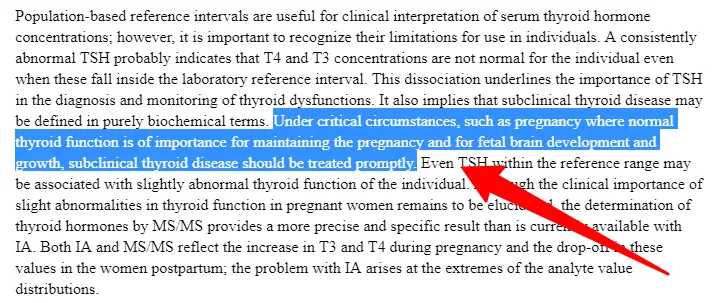
Thyroid hormone is incredibly important to the development of your child which is why all pregnant women should have their thyroid checked.
This is also why there are very strict guidelines (4) when it comes to managing thyroid lab tests during pregnancy.
The guidelines used by doctors (yes, even endocrinologists) are much more strict compared to the guidelines that are used for non-pregnant women.
For instance, a TSH greater than 2.5 mU/L would be considered bad in a pregnant woman (5) and a reason to start thyroid medication (some studies even recommend that this occurs in women who have no symptoms of hypothyroidism).
A TSH between 2.5 and 5.0 mU/L in a non-pregnant woman (6), on the other hand, would most likely be dismissed away by the same doctor.
So, yes, managing your thyroid is incredibly important during pregnancy and may require the use of thyroid medication.
And this is where our story starts.
What thyroid medications can you use? Are all types of thyroid medications safe during pregnancy? What kind of lab tests do you want to look for if you are pregnant and taking medication?
When conventional doctors (think about your ob/GYN, your endocrinologists, or your PCP) treat pregnant women who are also hypothyroid, they are really only looking at a few things:
#1. What medication you are taking and your dose.
Conventional wisdom is to place ALL patients on T4-only thyroid medications when they are pregnant and dose this medication based on the TSH.
This means that if you are not taking any thyroid medication, but your TSH is higher than the 2.5 mU/L I mentioned previously, your doctor will most likely recommend that you start taking levothyroxine or Synthroid.
And, if you are already taking some thyroid medication that contains T3 (such as Nature-throid or NP thyroid), your doctor will make the recommendation that you switch to T4 instead of T3.
This is the standard. To be on T4-only thyroid medication if you are pregnant.
#2. Your TSH and what level it is.
Your doctor will also want to regularly check your TSH (which stands for thyroid-stimulating hormone) to ensure that your TSH does not rise above 2.5 mU/L (or below 0.1 mU/L).
Your medication will be adjusted based on this level.
This is considered the standard or conventional care (7) and, while you should be aware of it, you should also be aware that there may be other potential options (including my own view of treating hypothyroidism).
Which is what we are going to talk about next.
Can T3 Be Used During Pregnancy?
And this is where our story continues.
What if you are someone who is already taking medication that contains T3 prior to pregnancy?
What if you are doing well on that medication and you don’t want to change?
Will staying on your medication actually cause harm to your baby?
These are very important questions so let’s tackle them one by one and use scientific studies to back up our conversation.
First off:
Is it possible to use T3 during pregnancy?
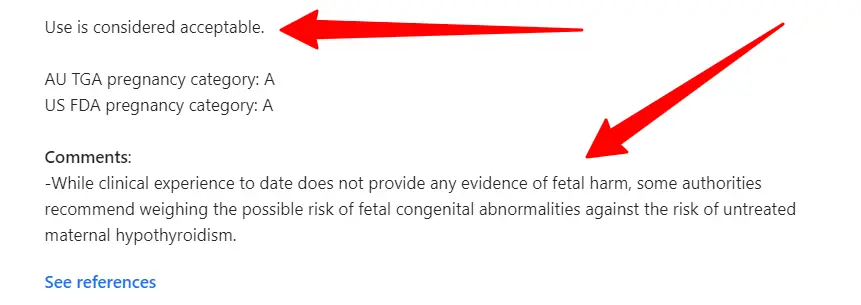
Yes, it is possible to use T3 medications if you are pregnant.
The question is not whether or not they can be used but how safe they are when used during pregnancy.
And in regards to that question, we don’t have much in the way of scientific data to help us out.
All we know is that liothyronine (which can be used as a proxy for all T3 medications) doesn’t seem to cause any harm to the fetus (and would be classified in the same category as levothyroxine in terms of safety).
And, at this point, all we have are theoretical dangers (8) that have not been substantiated by real-world clinical studies.
I have included a variety of studies below which discuss this topic in more detail so feel free to jump there if you want more information.
What if you are currently taking thyroid medication and then you become pregnant?
In most cases, and as long as you are not overmedicating yourself, it’s probably best to stay on whatever medication you are using prior to becoming pregnant.
Changing just opens you up to new problems and with thyroid management being so important in early pregnancy, it’s probably not wise to make big changes to the type of medication you are using.
We do know, however, that most women need to up their dose of thyroid medication once they find out that they are pregnant.
This stems from the fact that you must start providing thyroid hormone to both the growing baby and yourself.
So the general rule is to increase how much thyroid hormone you are taking once you find out you are pregnant.

I do find, however, that this is typically not an issue for patients under my care.
Most likely because they are already optimized prior to pregnancy (or perhaps taking slightly more than necessary) which means they don’t need much in the way of dose adjustments.
Will staying on your medication harm your baby?
The medication itself is not likely to cause any harm to your baby directly.
In fact, we have information directly from the FDA (9) stating that “Cytomel should not be discontinued during pregnancy” to imply that if you are using it prior to pregnancy there’s probably no benefit in discontinuing your medication.

Instead, if there is to be any harm, it’s going to stem from your dose of thyroid medication.
The same information from the FDA states that “There are risks to the mother and fetus associated with untreated hypothyroidism”.
The point here is that it matters less what type of medication you are taking and more that you are actually treating the condition.
If you take too much Synthroid (enough to cause hyperthyroidism) then that will cause a problem.
Just like taking too much of T3 can cause similar issues.
But the problems stem from the hyperthyroid state (10) and not the medication itself.
As long as you follow your labs (more information below) you shouldn’t have any major issues in this area.
What are the differences between T4 and T3 medications?
The reason that most doctors prefer to use T4 over T3 is that T4 is considered to be more ‘stable’ in the bloodstream.
T4 has a much longer half-life compared to T3 (11) which means that it stays in your system longer.
This makes sense given that T3 is the active form of thyroid hormone and is also the most powerful.
But just because it is used rapidly by the body and because it has a shorter half-life means that it needs to be avoided.
A combination of T4 + T3 (such as levothyroxine + liothyronine) can be used to get the best of both worlds.
You can maintain a steady level of T4 supply in the bloodstream and still gain some of the more rapid benefits of smaller T3 doses as well.
Which thyroid medications contain T3?
There are many thyroid medications that contain T3 but most doctors shy away from using them.
Medications that contain T3 include:
- Liothyronine
- Cytomel
- SR T3
- NP Thyroid
- Armour thyroid
- WP thyroid
- Nature-Throid
An Example of Using T3 During Pregnancy
If you’ve read some of my other articles you know that I will occasionally share lab results from patients that I am treating.
I want to do the same here, but these lab results are from my wife who has been taking T3-only thyroid medication (Cytomel) for her last 2 pregnancies.
But a word of warning:
Just because this treatment has worked for her doesn’t automatically or necessarily mean that it is right for you.
She has been taking T3-only thyroid medication for several years in order to treat hypothyroidism in addition to metabolic damage from an eating disorder early in her life as well as treatment-resistant depression (resistant to anti-depressants but responsive to T3).
Her liothyronine dose has ranged from 12.5mcg up to 50mcg per day (depending on a number of factors), but for pregnancy, we tend to keep the dose between 12.5mcg per day and 25 mcg per day.
She is currently in her third trimester and we recently checked her labs which you can see below:

Her TSH is currently reading at 1.35 mU/L and you can see the reference range at 0.45 – 4.50 mU/L.
The normal range should really read between 0.2 and 2.5 mU/L based on studies, but lab companies don’t always differentiate between pregnant and non-pregnant women making it important for you to know about this on your own.
Her labs are perfectly within the normal range for pregnancy using a T3-only medication.
I feel comfortable using this medication on her because it has worked for her for many years, both before she was pregnant and during her last two pregnancies, and she hasn’t experienced any negative side effects thus far.
A couple of things to note about her labs and case:
- Advanced thyroid lab tests are not always helpful during pregnancy – If you notice, I didn’t order free thyroid hormone levels. These aren’t always required (but I almost always order them in non-pregnant patients) due to how pregnancy influences blood volume and free thyroid levels. If you have an abnormal TSH, or if you are experiencing hypothyroid symptoms with a normal TSH then it would be a good idea to get these.
- Your TSH is much more important when you aren’t pregnant than when you are – Following your TSH during pregnancy is much more helpful compared to when you are not. Again, this has to do with the fact that pregnancy impacts both blood volume and thyroid lab tests making them less reliable compared to the non-pregnant state.
- Her TSH is not suppressed while taking T3 – It’s a common misconception that TSH must be suppressed when taking T3-containing medications. This doesn’t automatically occur and doesn’t always have to occur.
As I said, this example doesn’t mean that you should use T3, but I did want to provide you with a study of someone who has used T3 for two pregnancies without any issues.
I also have many other experiences in treating patients with NDT formulations (such as WP thyroid and Nature-throid) who have used these medications during pregnancy without any issues.
These are all anecdotal experiences, however, and not scientific in nature so keep that in mind.
I definitely wouldn’t give my own wife T3 if I thought that it was dangerous, however, which is why I shared this example.
Is T3 Safe to use if you are pregnant and have Hypothyroidism or Hashimoto’s?
When deciding whether or not to use T3 you should be aware that there are no studies available that definitely show that T3 is harmful to your baby.
On the other hand, there are also no studies that show that T3 is beneficial or can replace T4 during pregnancy either.
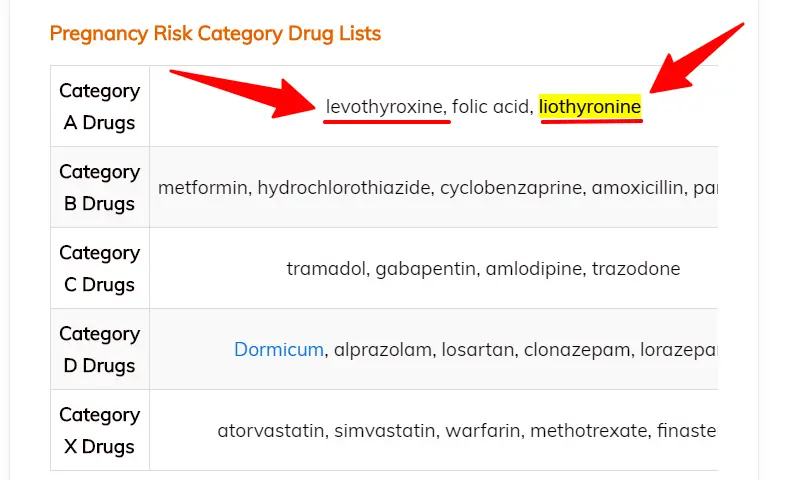
This puts you, as a pregnant woman, in a bit of a pickle when deciding what route you should go.
I don’t think it makes sense to automatically think that you need to take T4 medication if you are pregnant, however.
One of the main reasons that we don’t have a lot of studies on medications in pregnant women is that it’s very difficult, and sometimes dangerous, to do these studies.
But just because they don’t exist doesn’t mean that we can’t make assumptions or assertions about how you might do if you were to use T3 medication.
We know, for instance, that many patients around the world do better on a combination of both T4 and T3 (12), especially in the setting of DIO2 genetic defects.
Right away this tells us that there are some people, estimated between 10 and 20% of the population (13), who are not able to utilize T4 as well as others.
This would be encouraging for pregnant women who fall into this category and may need to consider using T3.
In addition, we also know that your own thyroid gland produces a combination of both T4 and T3 when it is healthy and functioning properly.
That production is approximately 80% T4 and 20% T3 (both from direct production and peripheral conversion).

The assumption could be made that if the healthy thyroid gland produces T3 on its own, even during pregnancy, using an exact replica of that hormone as a medication replacement might also be safe.
Lastly, we know that thyroid lab tests can be assessed and evaluated during pregnancy to ensure that enough thyroid hormone is entering the cells and is sufficient for the fetus.
We can look at factors such as TSH and free thyroid hormone levels to ensure that this is the case.
It’s also possible to evaluate your thyroid tests using isotope dilution tandem mass spectrometry (14) over the standard immunoassay.
This method of lab testing provides a more accurate view of free thyroid hormone levels compared to the immunoassay which can miss cases of biochemical hypothyroidism.
In my opinion, and based on this information, there is a place for the use of T3 medications in pregnant women.
Thyroid Lab Testing when using T3
Pregnancy causes physiologic changes in women and these changes alter how you should look at your lab tests.
The image below illustrates some of these changes:

- Iodine consumption increases (your body needs more iodine).
- Thyroid hormone production increases (to compensate for you AND your baby).
- Serum thyroxine and serum triiodothyronine (T4 and T4) increase
- Blood volume increases by 50% (15) (which can lower blood pressure and dilute the concentration of certain factors).
- Thyroid hormone-binding globulin increases.
- Free thyroid hormone levels remain unchanged.
- The fetal thyroid produces T4 but converts that T4 into reverse T3.
- An increase in hCG which may have thyroid stimulatory effects (hCG comes from the placenta).
- *Despite changes to T4, T3, and binding globulins, free thyroid hormone levels remain unchanged.
What’s important here is that these are all things that change once you are pregnant and they all have an impact on how you want to look at your labs.
These changes may be one of the reasons why many doctors prefer to look only at TSH but it should be noted that your free T3 and free T4 levels should not be dramatically altered even with the changes in blood volume and thyroid binding globulins.
If you elect to use T3 then you should be evaluating free T3 and free T4 in addition to your TSH.
I recommend following the TSH guidelines set forth by the USPSTF (16):
- First trimester TSH: 0.1 – 2.5 mIU/L
- Second trimester TSH: 0.2 – 3.0 mIU/L
- Third trimester TSH: 0.3 – 3.0 mIU/L
If you’ve read any of my other blog posts then you probably know that I have my own set of guidelines that I follow but I really believe that these guidelines are decent.
The guidelines outside of pregnancy are another story entirely, but these guidelines do allow for optimization toward the lower end of the reference range in regard to TSH.
You could easily dose your medication (whatever you elect to take) to optimize your TSH in the bottom area of that reference range.
Most TSH lab tests will flag a TSH under 0.45 mIU/L as “low” but these lower levels would be accepted as “normal” under the guidelines listed above.
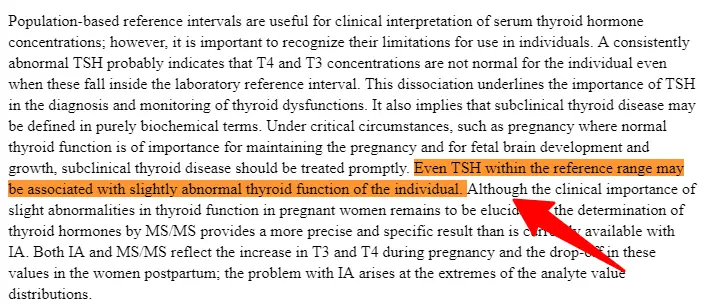
In fact, you could optimize your TSH between 0.1 and 0.44 mIU/L in the first trimester of pregnancy (read more about this idea here) which would technically be low outside of pregnancy but which would be perfectly normal during pregnancy.
This distinction is very important for you to understand, especially if you have a more advanced understanding of thyroid lab tests compared to most people.
I see a number of women who wrongly believe they need to push their lab tests to non-pregnant levels which may put them at more risk than any minor benefit they may be received by doing so.
In addition to testing for TSH, you will also want to look at both free T3 and free T4.
The reference ranges provided for these should be somewhere in the middle of the reference range (this will vary based on labs).
Outside of pregnancy I typically like to see these a little bit higher, but it’s safer in the pregnant state to keep them in the middle to avoid accidental overdosing or underdosing which can have negative consequences on the fetus.
Yes, you might experience slightly more fatigue than if your lab tests were more optimized but those small gains are probably not worth any increased risk.
Final Thoughts
There are situations where it may be a good idea to consider using thyroid medications that contain T3 if you are pregnant.
You should be aware, however, that this idea currently runs against conventional medical care.
But as we break down the logic behind the current treatment paradigm, it’s clear that these guidelines err more on the side of being conservative as opposed to erring on the side of safety.
There are many women who have successfully
Perhaps more important than what type of medication you are using is the DOSE that you are using.
It would be possible to overdose, or take too much thyroid medication when using ANY type of thyroid medication.
It is possible that due to how powerful T3 is compared to T4 that T3 may be more likely to cause side effects of excess thyroid hormone.
Now I want to hear from you:
Are you pregnant or thinking about getting pregnant and wondering what you should do with your thyroid medication?
If so, which way are you leaning? Which medication are you currently using?
If you have successfully gone through pregnancy using a T3 medication please share your experience below!
If you have any other questions or comments please leave them below as well.
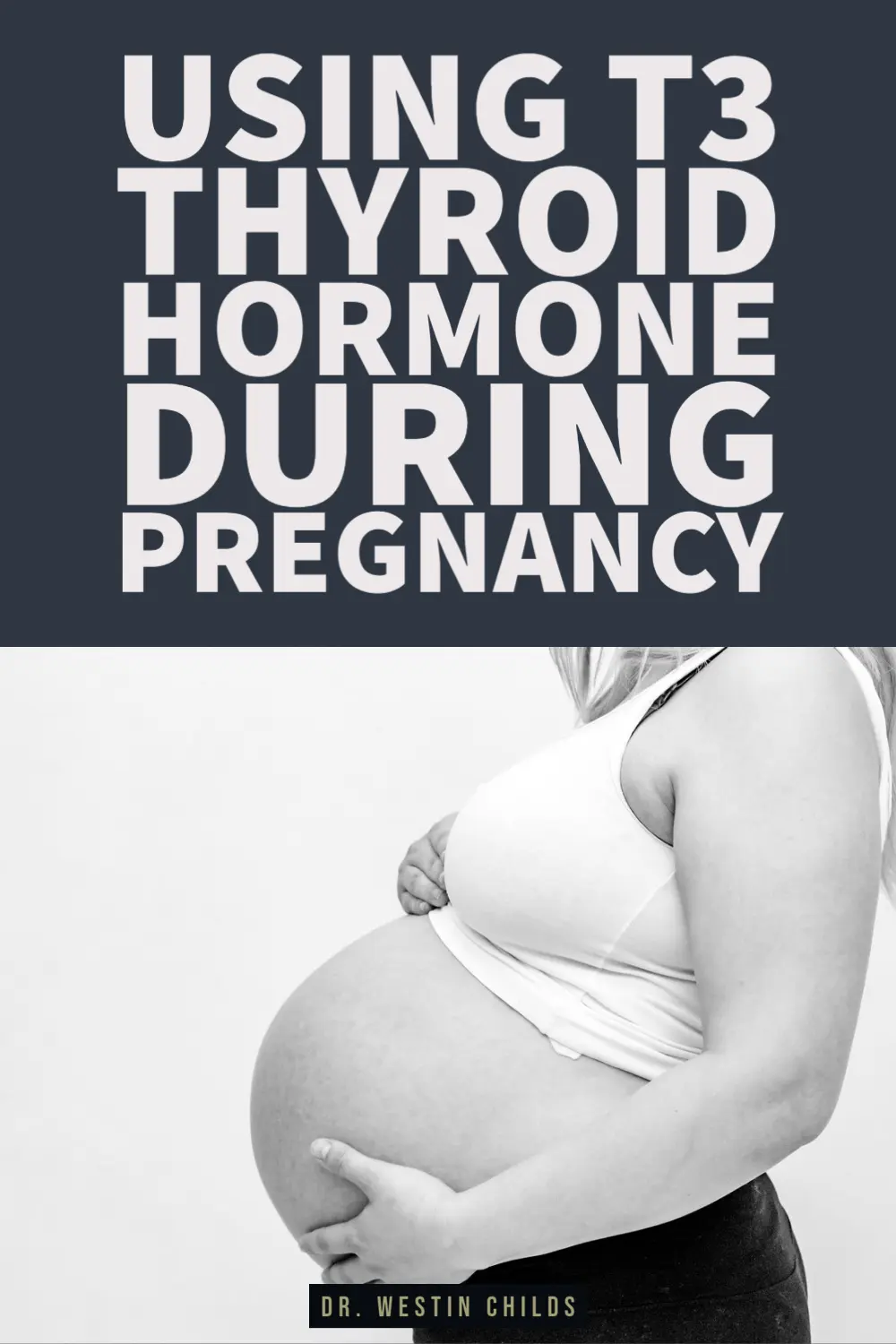
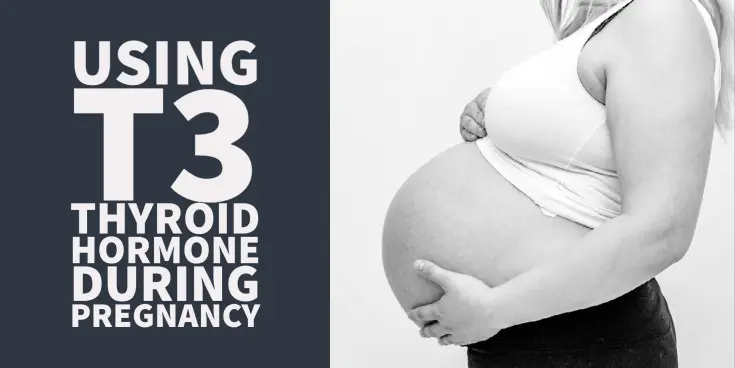







Hi, Dr. Childs!
I have had two children, now 4yrs and 2 yrs old. I tested positive with Tpo-a after my first pregnancy (which was an amazing, easy pregnancy), then reversed these antibodies after the autoimmune diet. At this time I was in Synthroid, felt well until my second pregnancy. I gained 60lbs, felt very hypothyroid the entire time and switched to cytomel 5mcg 1-2 times daily (not so helpful).
After the second delivery, I continued to feel hypothyroid. I tried changing to T4 (many different kinds) and even mixtures of T3/4. Now my antibodies are rising again, and anytime I take T4 (even a mix) I get severe hypo symptoms and huge elevations in my RT3 (30s).
I am hoping for another pregnancy, but currently, I’m on T3 SR 20mcg and still have fluid retention, wt gain, dry skin. My labs on this are TSH 0.1, FT3 6, low RT3 (10). Why do I feel hypothyroid with hyper labs?
I really appreciate any and all feedback!
I’m sorry correction from my previous post- my total T4 was 113, a free T3 was accidentally not drawn.
Caity
Hi Dr childs my daughter is currently 10 weeks pregnant on 25 mgs liothytoninr. Endo in Britain want to swap her to 135mgs Levi daily. She is heterozygous DIO2 and has done well in t3 only. Tsh is currently is 1.0. Please can you advise at all.
Hi Lynne,
Unfortunately, I cannot give specific medical advice over the internet but I would recommend you look for a competent physician near you or use this information to help you determine how to proceed.
This was very helpful to read. I have 3 kids and had to have a thyroidectomy after my 3rd. Since then, I’ve suffered 3 miscarriages and am now 7 weeks along and this pregnancy feels viable, but I’m nervous about keeping my tsh stable. I currently take 150mcg Synthroid and 5mcg Cytomel and my tsh has been between .4-.9 for at least a year. I did a tsh test before pregnancy and it was .6, then another about 6 weeks in and it was .45. My OB says my tsh is somewhat low and would like to see it closer to 1.0. But I don’t know if I should change anything? Things are going well so far; I had an ultrasound today and everything was on track. I’m baffled at how they would adjust my meds to get closer to 1.0… do you think they would they take me off Cytomel? Or just lower my Synthroid? It’s a tiny adjustment anyway, would it even be necessary?
Hi Michelle,
There’s no reason to move your TSH closer to 1.0. There are no studies which show that a TSH of 1.0 is better than a TSH of 0.4 or 0.6 or 1.2 or anything like that, it would simply be a preference of the doctor and really not worth making the change.
Hi Dr. Childs,
I recently switched to Armour after taking Levo for 7 years. My hormone numbers were wacky and my internist decided to give Armour a go in hopes of righting my hormone levels. It worked. And a month after I started taking Armour, I got pregnant. I was supposed to have my labs drawn at the beginning of the month, but decided to wait until my first OB appointment (yesterday) since I knew they were probably going to ask me to do that anyway. I just got the results back and I’m very worried. My T4 level was in range, but my TSH was over 17! I get the feeling that my OB wants me to switch to Levo during the pregnancy, but my internist just called in a higher dosage of Armour. Any thoughts on what I should do? Continue with Armour at a higher dosage or switch to Levo?
Hi Mallory,
Your internist is right, just increase the dose of your Armour, no need to change your meds.
I just found out that I am almost 5 weeks pregnant and had some blood work done about 3 weeks ago due to a miscarriage in February. My ND switched me from Armour to Levothyroxine after the miscarriage. My TSH is now 3.28 (which I know is still high) my Free T 4 is 1.4 and my Free T3 is 2.5. So she now has put me on T3 meds in combination with the T4. I am nervous to add something new after having only been on Levo for 2 months, however I also know my risk of miscarriage is much higher with my TSH being high. How quickly will it reduce my TSH level? I’m also wondering if I should be increasing my T4 dosage since I know most women bump up their levels esp early in pregnancy?
Hi Maureen,
I would recommend that you read both of these articles as soon as possible. They contain the info you are looking for plus a lot more:
https://www.restartmed.com/tsh-levels-during-pregnancy/
https://www.restartmed.com/thyroid-and-pregnancy/
Hi Dr, is taking natural source of T3/T4 ok during pregnancy? As I have read in some article and it says T3 from natural source do not enter fetus? I am currently taking Nature Throid.
Thanks
Hi Alice,
Yes, generally it is fine.
Hi Dr. Childs,
I am 27 weeks pregnant and am on 100 mcg of Levothyroxine daily. Just had my labs done and while my TSH was .786 my total T4 seems very high at 12.7. My total T3 was 1.2, FT4 was 1.4, and FT3 was 2.3. Do I have too much total T4 and is it dangerous to me or my fetus? Does this indicate an issue with conversion? Is adding supplemental T3 worth it this far into a pregnancy, or should one wait to explore adding T3 until after delivery?
Thanks so much, your information gives me so much peace!!
Hi there! I’m pregnant and having a tough time explaining my inability to use T4 to doctors. I’m on a combo of t3/ t4 now that puts me in normal ranges except for TSH which is suppressed.
How do you identify a genetic defect that relates to problems with deodinase enzymes? Is there a specific code I can look up in my 23and me report? Thanks!
Hi Gina,
You can learn more about the genetics of the deiodinase enzymes here: https://www.restartmed.com/thyroid-deiodinase/
Thank you for sharing your findings and for sharing your wife’s experience as well. Generally speaking, for 1st trimester pregnant women on T3-only medication who have normal levels of FT4 (i.e. 1.0 or higher pre/early pregnancy) and aren’t auto-immune, do they need to supplement with T4 , how early do they need to start that process, and to what blood level range would they aim for? Also, for women in the 1st trimester of pregnancy on T3, if their FT3 and FT4 remain generally within a typical functional range for them, but their TSH increases to somewhere between 2.0-2.5 (i.e. still under conventional cut-off for concern), should they start to supplement with T4 and/or increase T3? Finally, you mention isotope dilution tandem mass spectometry can more accurately measure FT4 levels than standard immunoassay. Is that something that can generally be ordered at Labcorp/Quest or is that done by a specialty lab?
Hi Dr Childs,
I’m trying to get pregnant. I was suffering with Hashi’s symptoms so had my medication upped (combination T3&T4). I now feel much better than I did before but my TSH is suppressed <0.03 (T4 = 13.7 and T3 = 5.5.) My tremor, body aches and cold sensitivity have completely gone.
Endo wants my TSH not to be suppressed. They advised to stop T3 and up T4 but the dose they recommended of T4 monotherapy I've already tried and I had hyperthyroid symptoms – rapid weight loss, palpitations, tremors. I'm afraid to make any more adjustments as symptom-wise I think I've found my sweet spot (for now). I don't want to make myself ill messing around with medication again.
Is TSH suppressed to this level with no hypo/hyper thyroid symptoms safe for conception/pregnancy?
Hi Dr Child’s! I’ve followed your research and your articles for a while now. In fact, when I was getting sick with the addition of any T4 I flushed my RT3 under your guidance. Since then I’ve added LDN and continue taking only T3. My TSH is finally .004 after years of bouncing around in the 4-14 range and I’m thrilled! However I just found out today that I’m 4.5 weeks pregnant. I know that my doctor is going to freak out at the concept of me remaining on T3 only throughout this pregnancy but for over 10 years even the smallest dose of T4 was making me very sick. I’m worried about the health and development of my baby and about my T4 being under range. (.6) I know that you can’t tell me what to do but in your opinion is it possible to have a healthy baby with a T4 under range?
Thank you in advance for your unmatched guidance and expertise in this area. I have found no other resource like yours and you have honestly changed my life.
I understand why this is all so personal for you because of your love and devotion to your wife and I can only say that it is amazing that you’ve chosen to help so many other people in the process of helping her.
-KJ/Seattle, Washington
Hi KJ,
I would say that it is certainly possible to have a healthy baby with a low T4 because my wife used T3 only through her most recent two pregnancies without any issue. This doesn’t guarantee that this will work for everyone, though, so keep that in mind and to my knowledge, there are no studies that have looked at this specific issue. I can’t tell you what you should do in your specific case but I wanted to at least provide that information for you.
Thank you. I’m so honored that you took the time to write back! I’m a member of 2 Facebook groups specifically for people on T3 only. And today I heard from a handful of women who continued on their T3 only treatments throughout their pregnancies and gave birth to healthy babies! It’s not a clinical study by any means but it’s evidence that disputes the theory that T4 is the only medication that can be taken during pregnancy to grow a healthy human! Thank you again!
Hi Dr Childs,
I read your article with great interest. I have hypothyroidism and have been doing quite well on 70mcg daily of slow release t3 only. I’m currently 4.5 weeks pregnant and tearing my hair out about what yo do.
I was determined to stay on t3 only during my pregnancy but I’m reading scary information from conventional medicine which says that t3 does NOT cross the placenta to the baby and that low t4 can lead to brain and nervous system problems for the baby. I’m worried sick and don’t know what to do.
Please can you clarify this question for me- does t3 cross to the baby or not? If not, will low maternal t4 lead to issues with baby’s development?
Thanking you in advance,
Barbara
Hi Barbara, if you happen to see this, can you share what you decided to do? Did you stick with T3 for your pregnancy? Thanks
I’ve been on Armour for many years now, about 120. My doctor wants me to switch to unithroid, and basically told me she won’t prescribe me Armour. I just discovered that I’m pregnant, and worried about switching to a totally different medication this early in my pregnancy. I’m fine with trying something new, but this just seems reckless. Should I find another doctor and try the new medication? My current tsh is 1.27.
Hi Julia,
If you make any changes to your thyroid medication during pregnancy it should be to increase your dose, not change medications or decrease it. Thyroid hormone is vital for fetal development and you shouldn’t risk making changes that can impact the cognitive function of your baby. You can actually say this to your doctor and let them know that they are putting your child at risk by making changes to your thyroid medication. Most doctors are terrified of pregnant women because of the liability so this may help you stay the course. There are studies at the bottom of this article that you can bring to them as well.
Hello,
I recently found out I’m pregnant and am waiting to get into my OB to confirm viability. I have hypothyroidism and have been treating it with T3 for a few years now. My last and only other pregnancy was a miscarriage and I’m trying to do everything possible to avoid another one. I got my blood work done yesterday and received my results: TSH 2.46 T4 Thyroxine 1.7 Free T4 0.4. I am waiting to hear back from my doctor on how she suggests we move forward, but I am not sure if I should be switching to levo because my T4 is low but also don’t want to risk switching. Whatever I can do to have a healthy and viable pregnancy is the goal but I’m not sure what the best solution is. Any insight would be greatly appreciated!
Hi Sarah,
Please see this article for more information on thyroid tests during pregnancy 🙂 https://www.restartmed.com/tsh-levels-during-pregnancy/
I’m 13.5 weeks pregnant and taking 137 mcg tirosint once daily plus 5 mcg cytomel twice daily. My tsh has been slowly dropping and the most recent reading was 0.02. FT3 and FT4 are both normal. I am seeing that I need to lower my dosage but I don’t know whether to start with the tirosint or the cytomel. I’m thinking it would be better to lower cytomel since it has a bigger impact on tsh and is less stable. Would it make sense to drop to 5 mcg and then retest? But what if ft3 drops below the middle of the range in the process?
Hi Bonnie,
Please see this article regarding TSH levels during pregnancy: https://www.restartmed.com/tsh-levels-during-pregnancy/
Hi dr Child’s!
I am currently 30 weeks pregnant and am taking 88mg of levothyroxine. My tsh is around 1.37 but my t3 and reverse t3 are on the high end of my ranges but still in range! Would it make sense at this point with only ten weeks left to add t3 meds to what I’m already taking?
I’ve heard of taking both before but never thought anything of it til I read your article which made me understand all of this so much better! It is very confusing sometimes. I am still not sure what I should do!
Thank you so much for taking the time to write this out for everyone!
Hi Kirsten,
The general consensus is to not make changes to something that is working “good enough” in a pregnant woman because you might cause more harm in the process. The best time to adjust your thyroid medication is obviously before getting pregnant or right in the early stages of pregnancy when fetal development is occurring at a rapid rate. It’s probably not worth making huge changes at this point unless you are symptomatic and experiencing issues with your current regimen.
Thank you so much for responding so quickly!
That’s what I figured. Thank you
Hi Dr. Child’s,
I’m hoping you can help me answer two questions? I’m currently trying to conceive and have already had one miscarriage. Currently on Synthroid 0.88mcg and Amour.
Is there any way to test a woman to see if she needs more T3 then T4?
Also if the T3 is low is it safe to add Cytomel while also taking Synthroid?
Thank you so much.
Hi Stephanie,
Yes, you can test both free T3 and free T4 by ordering lab tests with the same name. You can learn more here: https://www.restartmed.com/thyroid-tests/
And, yes, you can typically add cytomel to levothyroxine during pregnancy provided your labs allow for it.
Pregnant end of 1st trimester. Am I hyperthyroid and is my baby in danger? I take a crazy high dose but feel good. Doctor wants to immediately cut dose in half and switch to T4 only. I started T3 for a reason so would rather not stop.
I started 210 of NP Thyroid, which I increased from 180 after becoming pregnant. Hypo symptoms before increase. T3, T4 normal before increase. TSH <.005 before dose increase. Ever since FT3, FT4 normalized, my TSH has been <.005-.01 most of the time. (unfortunately lab failed to test FT3, FT4, they were normal 1 month before pregnancy)
Hi Michelle,
Unfortunately, I can’t provide medical advice regarding what you should be doing with your dose but I would caution against high doses of T3 during pregnancy. It’s quite safe to use T3 during pregnancy but you really don’t want to take too much as that may cause an issue. You can find the recommended TSH levels during pregnancy on this page: https://www.restartmed.com/tsh-levels-during-pregnancy/
Hello Doctor,
I heard T3 cannot pass the placenta, how come your wife did not take T4 and controlled hypothyroid only with T3 during pregnancy?
(I am also in the same boat)
Thank you!
Hello Dr. Childs,
I deeply appreciate the work you’ve contributed to helping so many of us on a path towards optimal health. I currently take 5mcg Cytomel and Synthroid 100. I’m 6 weeks pregnant and have been FREEZING cold the last 6 weeks. I advised my doctor that my hypothyroid symptoms are returning & I’m afraid that the health of the pregnancy will be impacted without prompt treatment. Her response was to increase Synthroid to 112, and discontinue taking Cytomel. She told me that the child will have fetal brain development issues if cytomel is used. I’m devastated because my instinct tells me my synthroid dose needs to be higher than the small increase she’s suggesting and I’m also scared to not take cytomel- yet do not want to cause harm to brain development. Do you know if cytomel will harm the brain development or if there’s studies associated? Lastly, if synthroid dose adjustments take several weeks to actually impact symptoms, would a larger dose increase be necessary to impact first trimester? My TSH is currently 1.6, thank you!
Hi Dr Childs,
I’m currently taking 10mg liothyronine to help with my rt3 dominance and subsequent hypo symptoms. The t3 does make me feel better and symptoms have somewhat subsided. Rt3 is @ 505 pmol/L (T4 12.3, T3 4.4 and TSH 1.1)
I just spoke to my doctor who said I will need to change to T4 medication when I get pregnant. This concerns me as per most articles about high rt3, T3 is required to lower the rt3 rather than t4 because of conversion issues. from what I read, rt3 also increases in pregnancy so my logic says t4 only would likely exacerbate the high rt3 issues I already have.
What’s your general thoughts about treating high rt3 whilst pregnant. Do you think t4 will only encourage even higher rt3?
Much appreciated 🙂
Hi Cin,
In my opinion, reverse T3 is more of a marker that something is wrong, not the problem itself. Using that logic, I don’t think it’s the correct approach to “treat” reverse T3, it’s more of a sign that indicates you need to find something.
In the healthy state, I see the elevation of reverse T3 during pregnancy as a protective physiologic mechanism, not something that must be addressed necessarily. You may find that the pregnant state exacerbates an underlying existing condition, but that just means something else still needs to be addressed.
Hello! My baby is 10 weeks old and I just learned today that the standard during pregnancy is T4 only (and an increase of about 30%). Well, I have been taking a T3/T4 combo for many years for non-hashimoto’s hypothyroidism, and it was never suggested to me that I change to T4 or increase my dose during pregnancy. I have no idea why I was never advised of this. My TSH was less than 1 at my 2 week follow up (although a normal level, that is lower than it had ever been for me and I had some symptoms of hyperthyroidism including losing all 25 pounds of my pregnancy weight in the first week). It’s back up to about 1.5 – I actually had 5 different kinds of thyroid labs run and an endo said they were all fine (everything was within range except T3 free which was only slightly high). Anyway, you ask for stories of taking T3 successfully and I would say I successfully took a combo T3/T4. And now I wonder why I was not told to change meds or doses!
Hi LS,
Given that mothers with healthy thyroid glands naturally produce T3 during pregnancy, it would be unlikely that T3 thyroid medications would cause any issues, provided them are dosed appropriately. The same would likely apply to T2 thyroid hormone as well.
Thank you for this article. I could never get or stay pregnant on Levothyroxine alone. I was fortunate enough to be guided in the holistic direction, & adding T3 helped support egg quality and helped me ovulate, and with the added support of progesterone cream and diet changes, I was able to conceive and have the healthiest pregnancy and delivery. I must mention that we had tried many fertility treatments over the span of 9 years. I will never go back to T4 medication alone. I understand the gap in thyroid care now limiting the conventional medicine side of things. Unfortunately, I had to learn this the hard way.
Hi Erin,
I agree, it is unfortunate, but thank you for sharing your story and I’m glad you were able to get the care and treatment you needed.